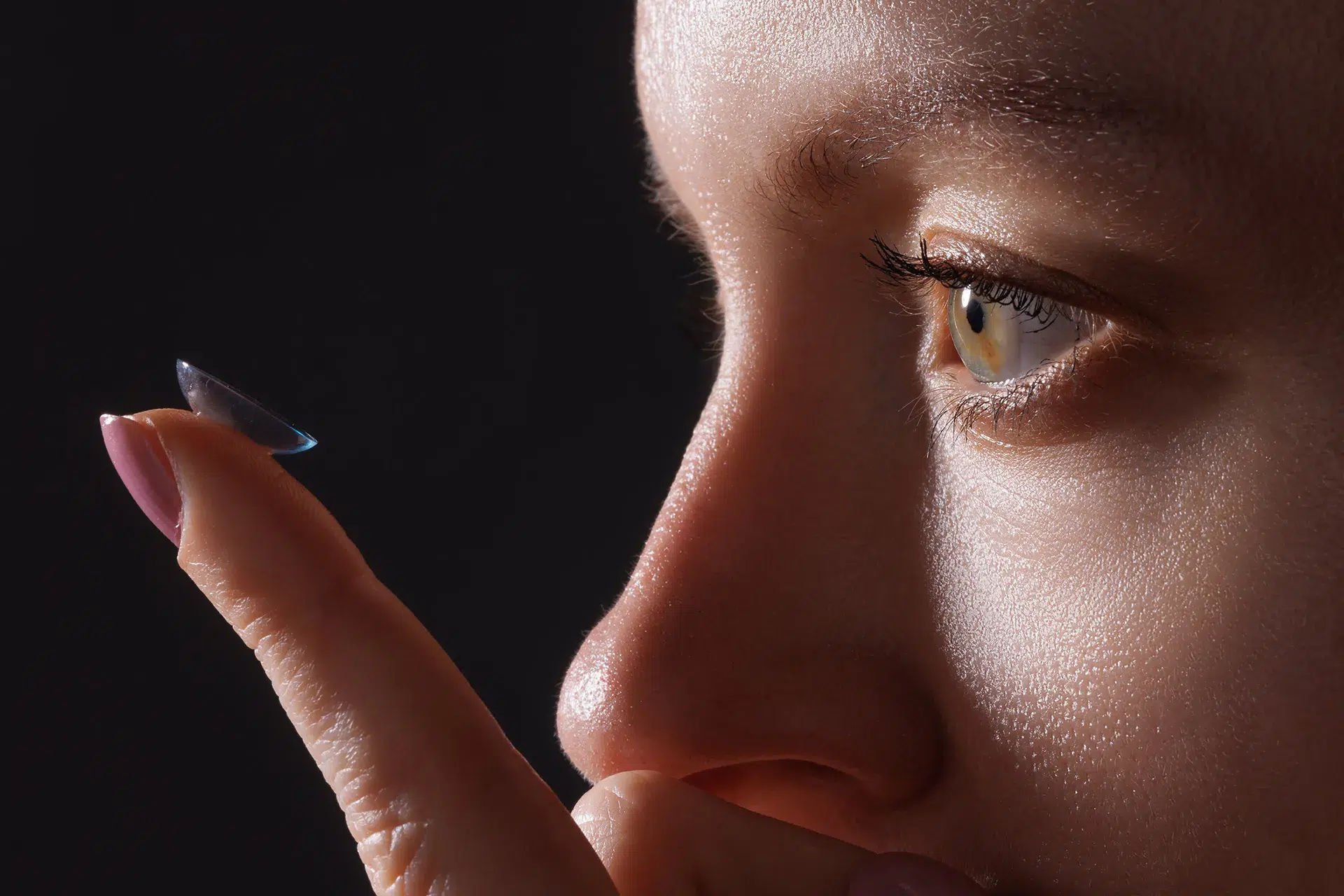You find yourself drifting off to dreamland after another long day, but just as you turn out the light, you remember you are still wearing your contacts. Should you leave your comfy bed to remove your lenses or just deal with them in the morning? Is it really that big of a deal?

We are here to explain why the answer to “Can I sleep with contacts?” is “No!” Below, we’ll explain why sleeping with contacts poses ocular health risks and advise you on the essential steps to take if you wake up with lenses still in your eyes.
Why Sleeping With Contacts In Is Risky
While some contact lenses are FDA-approved for overnight wear, we at Corsini Laser Eye Center strongly advise against sleeping in any contacts. Even lenses marketed for extended or overnight use can significantly increase your risk of an eye infection – 5.4 times higher, in fact. There are a few reasons for this, but it comes down to the immediate changes your eyes experience at night while wearing contacts.
- Lack Of Oxygen. Unlike other tissues in your body that get oxygen from blood vessels, your cornea is avascular, meaning it does not have any blood vessels from which to pull oxygen. Instead, it obtains oxygen primarily from the air and tear film. Wearing contact lenses overnight creates a double barrier (lens and closed eyelid) that significantly reduces oxygen supply to the cornea. This hypoxic state can lead to direct corneal damage, bacterial overgrowth, and impaired ocular immunity.
- Tear Film Stagnation. Your natural tear circulation slows dramatically when you sleep, as you no longer blink. When wearing contacts overnight, a trapped and stagnant tear film can create an environment where bacteria thrive.
- Contact With Your Cornea. “Contact” lenses get their name because, unlike glasses lenses, they contact (touch) your cornea. Overnight contact with a lens’s synthetic material can lead to corneal damage by causing minute scratches, inflammation, and surface cell damage.
- Exposure to Microbes via Contamination. Another reason we answer “no” to “Can I sleep with contacts?” is that overnight wear increases exposure to harmful microorganisms that can cause infections. This is especially true for lenses stored in a case or that have come into contact with tap water.
Even though modern contact lenses have improved oxygen permeability, they still can’t provide enough oxygen while you sleep. Long periods of overnight wear can lead to changes in blood vessel growth and dry eye syndrome. Moreover, sleeping in contacts can cause sight-threatening infections with permanent scarring or even perforation of your cornea.
Exceptions to the Rule
We approve overnight contact wear in two scenarios, which your eye doctor would monitor closely.
- Corneal abrasions. Ophthalmologists regularly place bandage contact lenses (BCLs) over patients’ eyes with large scratches to allow for a more comfortable healing. Instead of blinking over a raw and scratched cornea, patients can blink over a smooth contact lens. Your eye doctor will always prescribe an antibiotic eye drop with bandage contact to help prevent infection, and they will follow your progress closely with office visits.
- Post-surgical healing. Surgeons often place bandage contact lenses after LASIK and SMILE surgeries to promote healing in the first 24 hours after surgery. PRK patients wear BCLs for up to a week after surgery. Your surgeon will prescribe antibiotic and steroid eye drops to prevent infection and inflammation in these cases, and they will follow your healing very closely with post-surgical office visits.
What Kind Of Symptoms Should I Be Watching For?
If you regularly wear your contacts overnight, we recommend that you stop and watch for any of the following symptoms of infection.
- Eye pain or discomfort.
- Redness and inflammation.
- Light sensitivity.
- Excessive tearing.
- Blurred vision.
- Eye discharge.
- Foreign sensations are like something stuck in your eye.
If you experience any of these symptoms, we recommend contacting us for an appointment so we can diagnose and treat any ongoing infections, such as keratitis, conjunctivitis, or fungal infections. We’ll also walk you through the proper guidelines for handling your contact lenses, including handling, cleaning, storage tips, and contact lens safety.
What Should I Do If I Accidentally Fall Asleep With Contacts In?
If you forget to remove your contacts and fall asleep with them, take these steps:
- Apply preservative-free lubricating eye drops.
- Wait several minutes until your eyes feel more moisturized.
- Wash your hands with soap and water and dry them thoroughly.
- Carefully remove your contacts with your clean hands.
- Give your eyes a break from contacts for at least 48 hours.
- Avoid rubbing your eyes during this break.
- Monitor for any of the above symptoms of infection and book an appointment if you notice any.
Final Verdict – Can I Sleep With Contacts Every Once-in-Awhile?
It’s tempting to think that a one-hour nap during a commute or a 20-minute refresher will not harm your eyes, but even brief periods of sleeping in your lenses can cause injury or infection for the above reasons.
Going Beyond Contacts – Find A Better Alternative To Healthy Vision
At Corsini Laser Eye Center, we understand the challenges of wearing and maintaining soft contact lenses. If you’re in the habit of falling asleep with your contacts and want to break free from them, our modern vision correction procedures—LASIK, SMILE, and PRK—offer a long-lasting and personalized solution that eliminates daily lens wear. Call us at (484) 580-2166 or schedule your complimentary LASIK consultation with Dr. Corsini today, and let us help you achieve clear, comfortable, and healthy vision.


